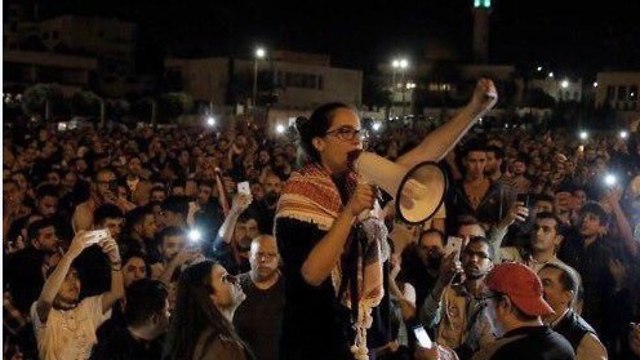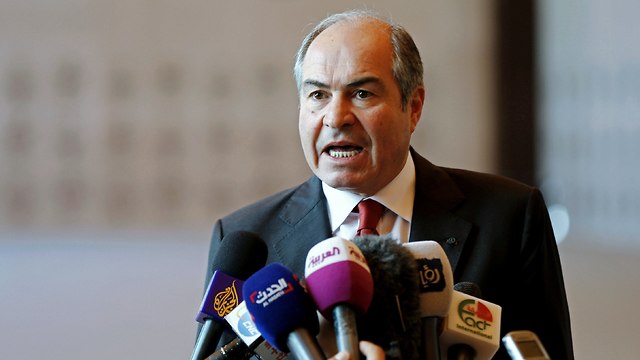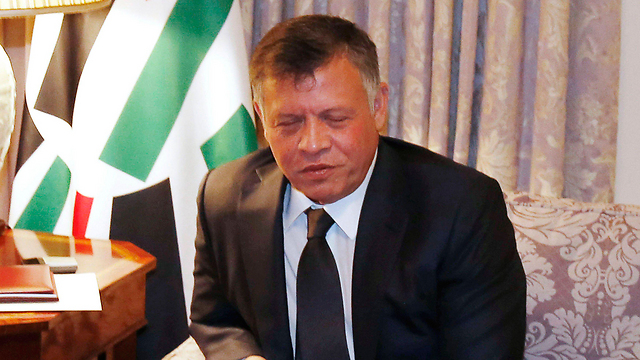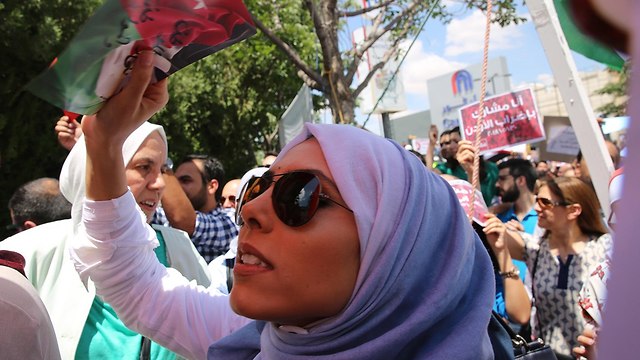

Why Israel should help solve Jordan’s economic problems
Op-ed: A chaotic situation in Jordan—and even more so, a collapse of the Hashemite regime—could have serious ramifications on Israel’s security and on the geo-strategic balance of power in the Middle East. Israel should therefore do everything in its power to help restore stability in the kingdom.
The protest was led by the trade unions and members of the Muslim Brotherhood movement. For the first time, it also included the loyalist Bedouin tribes. These are the biggest demonstrations since 2011.
King Abdullah cut short a visit abroad and returned to Jordan in light of the unrest in the Kingdom, issuing an order to suspend the government decision to raise gas and electricity prices in the country. The move didn’t put an end to the protests.

Last week, Prime Minister al-Mulki was forced to step down. The next day, King Abdullah appointed Minister of Education Omar Razzaz as prime minister. The king demanded that he launch a dialogue on the tax law which stirred up the masses and reexamine the entire tax system.
Jordan has been in a serious state of distress since Saudi Arabia and the United Arab Emirates failed to renew their aid package to the Kingdom—$3.6 billion for five years, which ended in 2017. The distress has been aggravated by the economic burden created by some 1 million Syrian refugees residing in the Kingdom, bureaucratic failures and an inflated and inefficient governmental system.
Jordan is also suffering from a serious water crisis as a result of global climate changes, which are reflected in the Mediterranean Basin in a drop in the amount of precipitation and a rise in temperatures, which lead to higher vaporization and dryness of the ground. At the end of the day, this causes a negative water balance.
Jordan’s foreign debt reached $35 billion this year. The budget deficit this year is expected to be more than $1 billion, and the average unemployment rate is nearing 18 percent, according to official data. In light of these economic figures, the World Bank has demanded that Jordan carry out painful economic reforms in return for economic aid.
A general strike was declared in Jordan on May 30, 2018, to pressure the government to withdraw the draft of the new tax law which it had submitted to the parliament’s approval, and the trade unions have threatened to launch another strike.
The Hashemite royal family, like the rest of the monarchies in the Arab world, survived the Arab Spring in 2011 and successfully handled a wave of public protests in the beginning of the year over the bread subsidy cuts. But in light of the country’s serious economic situation, it seems to be facing a particularly serious challenge, which could threaten the Kingdom’s stability.
At the moment, King Abdullah is still very popular in his Kingdom, and the criticism is directed at the elite associated with him—ministers, advisors, family members and financiers. They are perceived by most of the Jordanian public as corrupt and detached from the people. The king is therefore working to calm things down by restraining the government, but it won’t solve the Jordanian economy’s basic problems.
Jordan serves as a strategic security space for Israel against the Iranian threat, Palestinian terror organizations and radical Islamist terror organizations like the Islamic State. It also serves as an important component in the Saudi-led Arab-Sunni coalition against the Iranian expansion threats in the region and is an important ally of the United States.
There are also significant reciprocal relations between Jordan’s large Palestinian population and the Palestinian Authority and Hamas. The situation in Jordan will affect the options of reaching an agreement in the Palestinian-Israeli conflict.
A chaotic situation in Jordan—and even more so, a collapse of the Hashemite regime—could have serious ramifications on Israel’s security and on the geo-strategic balance of power in the Middle East. The State of Israel should therefore do everything in its power to help restore stability in Jordan.
At this stage, stability can be restored in the kingdom by offering immediate economic aid and building a plan for comprehensive and long-term economic reconstruction. Israel should work behind the scenes to advance such a move through the US, European countries and the moderate Arab axis states, which all share a strategic interest to maintain Jordan’s stability.
Past e
xperience shows that direct external involvement in countries’ affairs fails to contribute to the problems’ solution, and often even makes them worse. The Hashemite regime had the experience and abilities to deal with the current crisis, as long as it is offered the required economic resources, and this is something Jordan’s friends should do before it’s too late.
Col. (res.) Dr. Shaul Shay is the director of research at the Institute for Policy and Strategy (IPS) at the Interdisciplinary Center (IDC), Herzliya. He served as head of the National Security Council.


















